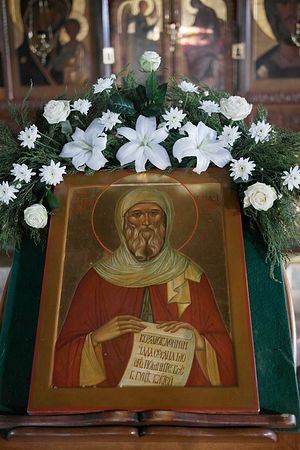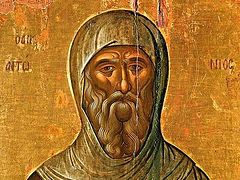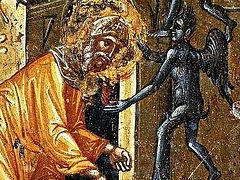 Today we celebrate the day of the translation to the Heavenly abode of the great ascetic and founder of the monastic life—St. Anthony the Great.
Today we celebrate the day of the translation to the Heavenly abode of the great ascetic and founder of the monastic life—St. Anthony the Great.
The life of the great St. Anthony was so full of various miraculous phenomena that we sometimes, reading his life and the hagiographies of other ancient saints like him, are amazed at how much their lives differ from our present life.
Sometimes this gives us cause to think that at that time there were people who were particularly gifted by nature, special chosen ones of God, who from time immemorial had been appointed by God to be receptacles of His grace.
Sometimes it seems to us that their times were something special, when the Lord was more generous with the gifts of the Spirit and poured them out seemingly without measure upon every Christian.
Thinking this way, we thereby forget the words of the apostle Paul, who said that Jesus Christ is the same yesterday, today, and forever (Heb. 13:8).
We forget that the ancient saints were the same as you and I by nature; they had the same infirmities that we see in ourselves: They also experienced hunger as we do; they also wanted to sleep; their bodies suffered the same sicknesses as you and I.
God has no partiality. We hear the same Divine voice now that St. Anthony the Great heard, that the host of great ascetics and saints following after him heard, that future generations of Christians who are coming after us will hear: Behold, I stand at the door, and knock: if any man hear My voice, and open the door, I will come in to him, and will sup with him, and he with Me. To him that overcometh will I grant to sit with Me in My throne (Rev. 3:20-21).
Our Lord Jesus Christ created this visible world for our sake; He descended from Heaven for our sake, becoming a man like us; He poured out His Divine blood for us upon the Cross in terrible sufferings to grant us such blessings that we on Earth cannot even imagine.
Therefore, there is probably no greater sorrow either in Heaven or on Earth than the sorrow of knowing that Christians neglect the unspeakable gifts we are called to inherit.
It was this sorrow that seized the heart of St. Anthony when one day his disciples, seeing with what great zeal an innumerable multitude of monks were laboring in the desert, asked him: “Father! Will this zeal and fervor for the virtues to which we and this whole multitude of monks are inclined, almost without exception, continue for a long time?” Then the saint, sighing and shedding copious tears, proclaimed to them a terrible prophecy about the state of Christianity in the last times, about how the straight and narrow path of the virtues will be abandoned by many, because of which many will follow the impulses of their reason and flesh.
However, he added, against the background of this general departure, among the Christians of those times, some will be far better and more perfect than us: because more blessed is he who could have sinned but did not, could have done evil but did not, than he who had countless examples of asceticism before him, by which he is unwittingly drawn to good.
These words of the God-pleaser are a source of great consolation for us. That means we, in our present situation, although it sounds impudent, can ascend to the same level of perfection as St Anthony the Great! That means that in our present impoverishment of the gifts of the Spirit, we have the chance to prove to the Lord our love for Him, and the Lord awaits this love from us.
In the life of St. Seraphim of Sarov, there is one episode where the Mother of God appeared to him and revealed that a martyr’s podvig is possible even now, only in a different form. If the martyrs openly suffered before, now they suffer secretly, with various heartfelt sorrows, and their recompense will be the same as for the ancients.
By the providence of God, every time is given its own kind of sufferings. Knowing this, let us always remember that our seemingly small podvigs and sufferings for the sake of Christ, which we bear in our daily lives, acquire a different value in the eyes of God in our present situation than in ancient times. In this is the great mercy of God towards us.
Let us remember the words of St. Anthony the Great: “Let us believe in our Lord Jesus Christ with our whole hearts, and live according to His commandments, and He will have mercy on us in His Kingdom, when we leave the pilgrimage appointed for us in this world.” Amen.



